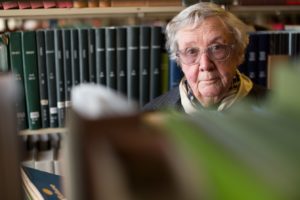Tuesday, 10 January 2017
Dear Professor Stirling,
Congratulations on a most beautiful and demanding collection of conversations with works of art in the Flinders collection. I am stunned and delighted by the connections being made. To have the Microscope Project here with its insistence on connecting the sciences and humanities as it does in the Hub, to have so much that speaks of so many aspects of life is compelling. And to have some of the ‘conversations’ as poems! Please express my appreciation to all who made this book possible.
It will take quite a while to read each one. Nothing is to be hurried about this. It is a book to go back to again and again.
You rightly emphasize the significance of the Flinders University Art Museum and the City Gallery and its role as ‘a site of inspiration and creativity and fertile ground fro meaningful engagement with our students, staff and the wider world.” That speaks of the need for recognition of the role of the humanities is the life of the university.
So many areas of the university that speak directly and certainly to the past, present and future of human existence are well represented. I note in his Foreword that the Deputy Vice Chancellor (Research), Professor Saint, says “Above all the collections are a unique and extraordinary intellectual resource, not only for the study of art but as a tool for teaching, learning and research across topics and in myriad disciplines.
It is for this reason that I list here so many of the areas of the university that took part in these conversations, showing that they recognise the vital connections across the disciplines that the divisive and destructive ‘two cultures’ notion set out to destroy to the disadvantage of all. Art is the unifying element. It is the catalyst here and I am so grateful that Flinders University has made it possible for so many of its members to contribute to the conversations. One must buy the book to read how each person responds to the work he or she has chosen. One discovers in this way what each contributor brings to her and his role as part of the Flinders University community. That is what is here for me in “Speak to Me”.
As a former member of Council and the Senate to see so many connections across the disciplines, in these lateral ways, gives me hope for the future. Medicine is here. Anatomy and Histology. Health Sciences. The Humanities and the Creative Arts – English, Creative Writing and Australian Studies. Hydrogeology and Ground water. Environment. The Adelaide College of the Arts. A PhD candidate in Law. The School of Computer Science, Engineering and Mathematics. Psychology. Project Officers. Tjilbruke Teaching and Learning. Oasis – fostering intellectual as well as spiritual well being across all disciplines for everyone, (I was there, as a secular humanist, at its inception so I feel I can give here what Oasis means to me). History and International Relations. Flinders Business School. Archaeology. An Administrative Officer – Policy and Secretariat. Australian Studies. Social & Policy Studies, Politics & Public Policy. School of Biological Sciences – Palaeontology. The Grounds Operations Supervisor. The Collections Manager. The Office of Indigenous Strategy and Management. The National Institute of Labour Studies. The Caretaker – Facilities and Property Management. Exhibitions Manager Art Museum & City Gallery. Special Collections Librarian, Central Library. Manager -University Records & Archives. Tourism in the School of Humanities and Creative Arts. The School of Education. A Research Fellow conversing about ‘Data and Art’ and Yunggorendi Student Engagement. Department of Screen and Media. And Shakespeare is here in a conversation about Macbeth.

I should like this response of mine to go into the Alumni newsletter. I think the Alumni of the university and others should read and feel the special qualities each contributor brings in his and her response to the work chosen and what it indicates about their contribution to their place in the university. Art awakens emotional as well as intellectual responses. This is an outstanding contribution to Flinders University’s 50th anniversary and complements “Investigator Transformed” in a most important way as Flinders moves into its 51st year.
Yours sincerely
Erica Jolly

